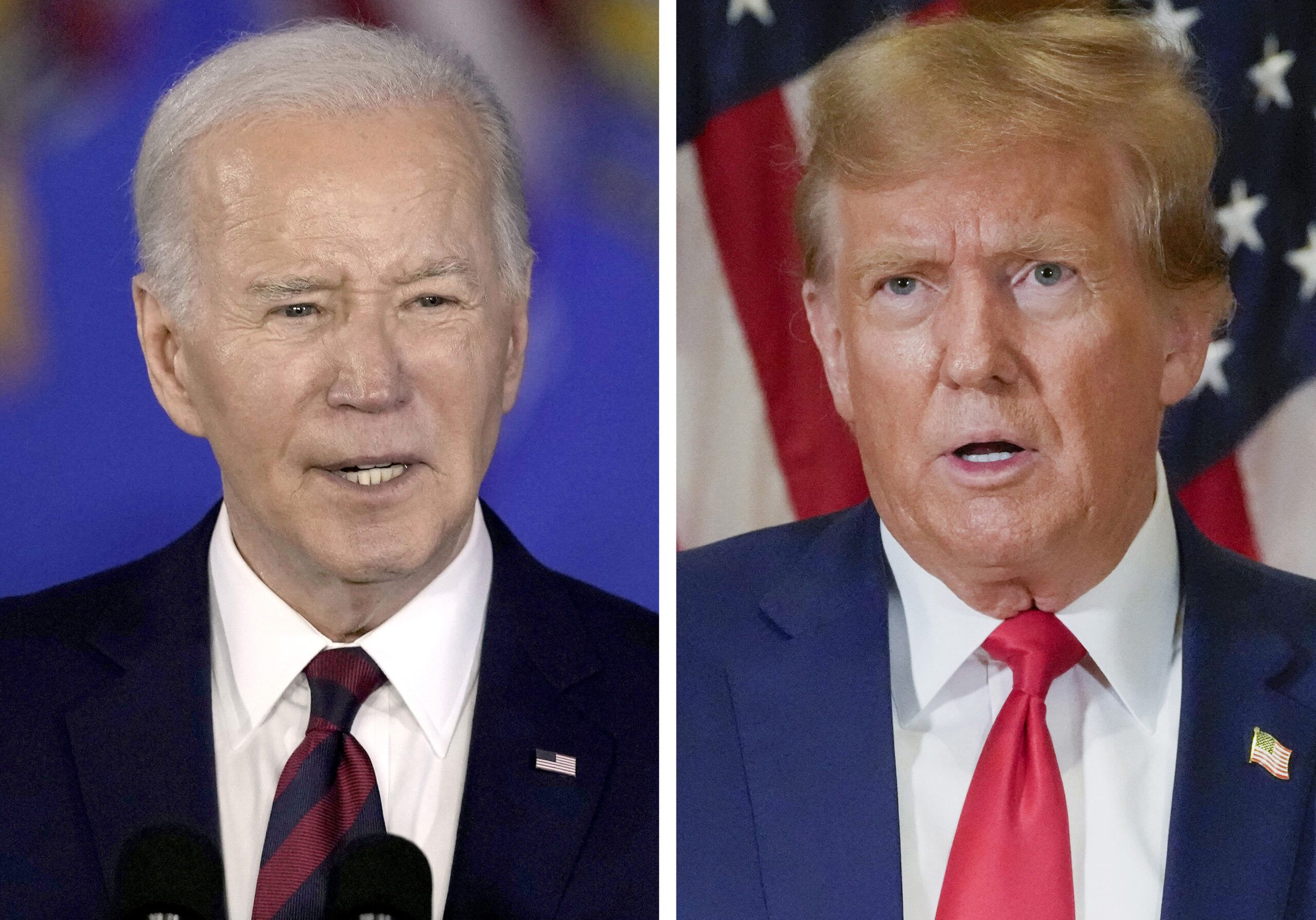

The 2024 general election may have the same cast of characters, but the campaigns of President Joe Biden and former President Donald Trump are poised to provide this cycle with a couple of plot twists.
In addition to 2024 doubling as a 2020 rematch between a historically unpopular incumbent president and an unprecedentedly criminally indicted onetime commander in chief, the electoral landscape has changed structurally and politically.
From a new Electoral College map and election law reforms, Biden and Trump are running on different issues and different records.
PART ONE: ‘NO ROOM FOR ERROR’ ELECTORAL MAP HAMPERS BIDEN’S REMATCH WITH TRUMP
PART TWO: BIDEN ONCE BACKED PROTESTS ON WAY TO 2020 WIN. NOW, HE’S THEIR TARGET
PART THREE: DEMOCRATS BANK ON ABORTION TO CARRY BIDEN AS GOP ADJUSTS STRATEGY
PART FOUR: BIDEN TRIES TO LEVERAGE HIS INCUMBENCY AGAINST A FORMER PRESIDENT
PART FIVE: NEW ELECTION LAWS SET TO SHAPE HOW MILLIONS VOTE IN NOVEMBER
Electoral College map changes
The 2020 census found significant population shifts, shaking up congressional maps and, as such, the Electoral College strength of key states, to Trump’s advantage.
The consequence of population fluctuations in Texas, for example, is that the Lone Star State now has two more congressional seats, while Colorado, Florida, Montana, North Carolina, and Oregon have an additional one, according to Daron Shaw, a government professor at the University of Texas, Austin.
“New York, Pennsylvania, West Virginia, Ohio, Michigan, Illinois, and California each lost one seat in Congress,” Shaw told the Washington Examiner.
The shake-up to the map means a shake-up for Biden and Trump’s pathways to 270 electoral votes. That is because if the 2020 election were held today, Trump would be awarded 235 votes, not 232 — 35 short of the 270 majority required for the presidency. Biden would receive the remaining 303, not 306.
The new math also means Biden and Trump could deadlock with 269 votes apiece if the former president were to win the battleground states of Arizona, Georgia, Nevada, and Nebraska‘s 2nd Congressional District. Trump allies were hoping to help, with Nebraska Republicans considering tinkering with their election laws so the state no longer splits three of its votes by congressional district, delivering Omaha’s vote to the former president.
If there is a tie, the contest would come down to what is called a contingency election, where every state congressional delegation would have one vote each. With Republicans expected to have a majority of congressional delegations after the election, Trump would likely become president again.
“Flipping anything else — Wisconsin, Michigan, Pennsylvania, Minnesota, Virginia — would be for the win,” Shaw said. “Michigan, Wisconsin, and Pennsylvania may be enough for Biden, but he literally has no room for error.”
Voting rules changes
The election law milieu has similarly been modified since 2020 because of the COVID-19 pandemic and Trump’s insistence that the election was stolen.
Of the battleground states, Michigan, Nevada, and Pennsylvania have expanded voting access since 2020, while Southern counterparts, including Georgia and North Carolina, have introduced restrictions. Arizona, New Hampshire, and Wisconsin have done the same.
Voters in Michigan, for example, passed a measure known as Proposition 2 in 2022 to implement a nine-day early voting period and the use of more forms of identification and drop boxes, with residents permitted to place themselves on a permanent list to receive absentee ballots every election.
In Georgia, a state that Trump won in 2016 but lost in 2020 to Biden, Gov. Brian Kemp (R-GA) signed legislation in 2021 that removed Georgia’s secretary of state as the head of the state elections board, reduced the number of drop boxes, and shortened the length of runoff elections from nine weeks to four weeks after the general election. Meanwhile, North Carolina residents will have to produce an ID to vote in person for the first time in a presidential election this November.
While Arizona’s reforms are about voter citizenship and New Hampshire’s reforms focus on identification, in Wisconsin, the state’s now liberal-leaning Supreme Court will deliberate Teigen v. Wisconsin Elections Commission, a case from 2022 when the bench was comprised of more conservatives that banned the collection of absentee ballots through drop boxes.
New grievances
In 2020, George Floyd’s death in police custody instigated demonstrations at home and abroad. Four years later, there is civil unrest again, this time over the Israel–Hamas war after the Oct. 7, 2023, terrorist attack and America’s support of Israel’s right to defend itself amid humanitarian concerns for people in Gaza.
Arab, Muslim, liberal, and young voters (key constituencies of Biden) have expressed their outrage over the president’s policy toward Israel through protest primary votes, most notably when 115,000 Michigan Democrats cast uncommitted ballots in February, and college student encampments. But while Democrats, including Biden, and Republicans have condemned the antisemitism demonstrated by some protesters, the GOP has denounced more liberal Democrats for seeming to sympathize with the hate.
Biden has sought to appeal to more liberal Democrats by, for example, pausing a shipment of 1,800 heavy MK84 2,000-pound and 1,700 500-pound bombs to Israel this month after a disagreement with Israeli Prime Minister Benjamin Netanyahu over his desire to invade the southern Gaza city of Rafah. But last week, the president announced he had approved another $1 billion in weapons to Israel, incorporating $700 million in tank ammunition, $500 million in tactical vehicles, and $60 million in mortar rounds, underscoring his commitment to Israel and Jewish Americans.
Regardless of Biden’s overtures to both sides of the war, a Reuters/Ipsos poll last week found 44% of registered Democrats disapproved of Biden’s handling of the conflict, with many of those Democrats telling pollsters they were less likely to vote for the president in November.
But with a Harvard Youth Poll from March indicating the economy is the top priority for respondents at 27%, Democratic strategist Mike Nellis contended that “this race hasn’t fully aired out that choice yet.”
“The more voters start to tune in — and let’s be clear, almost nobody is tuned into this election right now — they’re going to make a decision between continuing on with Biden’s leadership or going back to the Trump era. This race hasn’t fully aired out that choice yet,” Nellis told the Washington Examiner.
Abortion
Since the Supreme Court‘s repeal of Roe v. Wade in 2022, abortion access has rallied Democratic voters across the country, even in red states, such as Alabama, Kansas, Kentucky, and Ohio. Biden is hoping for a repeat in 2024, the first post-Roe election, with abortion likely to be on the ballot in Arizona, Florida, and Nevada.
Since Dobbs v. Jackson Women’s Health Organization, Biden, himself once an abortion skeptic, has criticized Republicans for being “extreme” on abortion as, for example, Trump doubles down on comments about monitoring pregnant women and after the Alabama state Supreme Court complicated in vitro fertilization procedures. The Biden campaign and aligned Democratic groups have spent $75 million on abortion-related ads in 2023, with Democratic super PAC American Bridge 21st Century planning on doling out $25 million through early June.
“Trump ended it and Biden will restore it,” Democratic strategist Mary Anne Marsh told the Washington Examiner of Roe. “It is the one issue that will determine the outcome of the presidential race. Women will overwhelmingly vote for Biden and Democrats to restore their right to an abortion and to stop Trump and the Republicans from taking even more rights away from them.”
In response, Trump has had to approach abortion in a manner acceptable to his Republican base, which has supported the end of Roe for decades, as well as independents, as he tries to reorient public discourse around the economy and border, where he is stronger politically. Trump was scrutinized last September during the Republican primary by anti-abortion activists after he described six-week abortion bans as “terrible.”
“My view is now that we have abortion where everybody wanted it from a legal standpoint, the states will determine by vote or legislation or perhaps both,” Trump said in April. “Whatever they decide must be the law of the land — in this case, the law of the state.”
“Joe Biden and the Democrats are radically out of touch with the majority of Americans in their support for abortion up until birth and even after birth and forcing taxpayers to fund it,” Trump campaign spokeswoman Karoline Leavitt added to the Washington Examiner.
Trump’s legal problems
Trump, the country’s first twice-impeached president, is also the country’s first former president and presidential candidate to be criminally indicted — not once, but four times. But while his legal problems present one of his greatest personal challenges, they have created political opportunities in 2024 too.
Trump has cited his legal matters, from special counsel Jack Smith‘s federal investigations into the former president’s efforts to remain in power after the 2020 election and his handling of classified information to his New York hush money trial and Georgia election interference case, as examples of lawfare and the weaponization of government against him. Trump has successfully fundraised off of his complaints and used his post-court appearances to amplify other campaign messages, such as on the economy.
At the same time, although Trump experienced a polling bump early during the Republican primary and raised millions of dollars from his indictments, he has had to spend that money defending himself. The pro-Trump leadership PAC Save America disclosed in April that it had paid $60 million in legal consultancy fees for the former president since the start of 2023.
With Trump’s freedom at stake, the political ramifications of any convictions are uncertain — Trump’s supporters have coalesced behind him and his opponents the opposite. The New York hush money trial brought by Manhattan District Attorney Alvin Bragg over claims the former president falsified business records to cover up payments he made to prevent the publication of stories about extramarital affairs before the 2016 election will likely be the only verdict returned before November.
Trump is simultaneously dealing with civil lawsuits against him personally, including legal action taken by writer E. Jean Carroll over allegations of sexual abuse and defamation, and the Trump Organization after an investigation by New York state Attorney General Letitia James into accusations of fraud.
Biden has a record
In 2020, Biden was the challenger, with no presidential record to defend. Four years later, Biden and Trump’s roles have reversed, with Trump benefiting from an increasing sense of nostalgia for his pre-pandemic years in office.
The biggest difference between 2020 and 2024 is that “a Biden presidency is no longer theoretical,” according to Republican strategist Cesar Conda.
“The voters can compare and contrast the Trump and Biden track records on inflation, the economy, border security, and foreign policy,” Conda told the Washington Examiner. “On all of these fronts, Americans were clearly better off under President Donald Trump.”
Meanwhile, Biden emphasizes that Trump’s “extreme” positions on abortion and the border, his conservative stances on taxes, entitlement reform, and healthcare, and his temperament and lack of leadership disqualify him for a second, nonconsecutive term.
For Georgia State University political science professor emeritus Daniel Franklin, incumbents tend to have an advantage because of the bully pulpit and fundraising since “a lot of people have an interest, both ideological and pecuniary, in the policies of a presidential administration.”
“The state of the economy, measured as the direction of the economy, the standing of the president’s party, and incumbency,” Franklin told the Washington Examiner. “Biden happens to have the advantages of incumbency in office while there appears to be some nostalgia for Trump. This is a very unusual situation.”
Mike Nellis, the Democratic strategist, agreed the 2024 election is “odd” because both candidates are “essentially running as incumbents.” The candidates also have weaknesses with their respective bases — Biden with liberals, in part, because of the Israel-Hamas war and Trump with centrists who, for example, keep supporting the likes of former Ambassador to the United Nations Nikki Haley in the Republican primaries.
CLICK HERE TO READ MORE FROM THE WASHINGTON EXAMINER
“When you’re an incumbent, you’re running on your record, and there’s always a risk of the election becoming a referendum on you,” Nellis said. “2020 was clearly a referendum on Trump’s administration, especially his handling of COVID.”




